On
Sunday our meeting for reverence was led by a visitor – the Unitarian District
Minister for London and the South East of England, Rev Martin Whitell. Martin had already conducted two Unitarian weddings
at the Ringwood Meeting House but this was the first time he had come to lead our
regular meeting for reverence.
He
took as his theme “The Sounds of Silence.”
Our
gathering followed our usual format, starting with a simple ritual. Our silent ritual can be interpreted in a
variety of ways, since we each place meaning on it privately. For instance, one interpretation might be that
it honours the four fundamental elements fire, earth, water, air. Another interpretation might see the same ritual
as reminding us of “light of spirit or soul connecting us”, “bread of life
given for us”, “water of life moving through us”, “breath of life inspiring us”.
But there are as many different meanings
as there are people taking part, because as Unitarians we do not impose
doctrine (religious theory or explanations) on anyone.
Included
in the meeting were a mixture of readings, silence and music, both for
listening to and for joining in with. There was “Songs without Words” (Op
38 no 6) by Felix Mendelssohn. There was
also a piece performed by the Dunblane Cathedral handbell ringers. Two hymns from the most recent Unitarian
hymnbook were sung and then Martin reflected on the role of quietness in our
finding our way in life. The Simon and Garfunkel
song “Sounds of Silence” gave more food for thought. The texts of the hymns and readings explored
the religious experience of realising in quiet times things that are not easy
to put into words but that underpin life choices and changes.
Also
as usual, we lit candles as we shared our current joys and concerns. This part of the meeting sometimes has many
words out loud, and sometimes almost none at all. Yet it is always one of the most moving parts
of our time together.
These
are some of the words that were used during our meeting:
We listen too
much to the telephone and we listen too little to nature. The wind is one of my sounds. A lonely sound, perhaps, but soothing….
As a matter of
fact, one of the greatest sounds of them all — and to me it is a sound —
is utter, complete silence.
André
Kostelanetz (1901–1980) Russian conductor
 And the people bowed and
prayed
And the people bowed and
prayed
To the neon god they made
And the sign flashed out its warning
In the words that it was forming
And the sign said “The words of the prophets
Are written on subway walls
And tenement halls
And whispered in the sounds of silence.”
© 1964 Words by Paul Simon
True silence is
the rest of the mind;
it is to the
spirit what sleep is to the body – nourishment and refreshment.
William
Penn (1644–1718)
You can hear the
footsteps of God
when silence
reigns in the mind.
Sri
Sathya Sai Baba (1926–2011)
Indian
guru and philanthropist
Let us be silent,
that we may hear
the whispers of the gods.
Ralph
Waldo Emerson (1803–1882) Transcendentalist






































